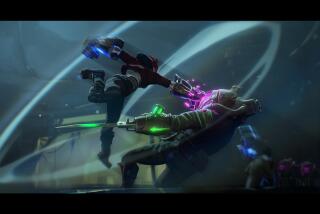Irvine Company Stakes Future of Video Game on Free On-Line Samples
- Share via
IRVINE — An Orange County video-game maker hopes to make a killing by giving its product away.
Thousands of people have been playing “Descent,” a shoot-’em-up computer game by Interplay Productions Inc., since December, the company says, when it began offering a basic version on-line for free. Starting Friday, players who want the more advanced version will be able to get it at stores--at $30 to $40 a copy.
By introducing its game as a freebie, Interplay has turned to a time-honored marketing tactic of companies ranging from cereal makers to cosmetics manufacturers: Get the customer hooked with a giveaway, then add the price tag.
“Nothing’s going to sell unless it’s getting good word-of-mouth from users,” said Trish June Wright, Interplay’s vice president of marketing. “If the product is strong enough, getting it into people’s hands (for free) is only going to help sales.”
Strong sales for Interplay are no sure bet. Other software makers have given away on-line versions of their products so complete that users had no incentive to pay for what amounted to only a slightly more sophisticated program.
But game makers and other software companies are turning to so-called shareware and free disks as a strategy akin to handing out tastes of a new cheese spread in a supermarket aisle in hopes that shoppers will buy a whole jar.
Because copying and sending electronic information can be done cheaply, distributing a free sample costs the manufacturer of a video game almost nothing. The advent of CD-ROMs, which can store massive amounts of data, has also brought down costs.
In retail outlets, though, computer games sell for $50 and more, which leaves a healthy profit even after subtracting the cost of packaging and distribution.
“Shareware is an attempt at a solution to a major problem, which is that, until you try it, how do you know if you’re really going to like it?” said Lee Isgur, managing director of gaming and interactive entertainment at Jeffries & Co., a San Francisco investment bank.
Just because a company’s shareware is popular, though, doesn’t mean that the program will sell well, Isgur said. Also, the audience for the two may not be the same, he said, noting that a fair degree of technical skill is required to download a program from an on-line network.
“You don’t know how much you’re helping the products you want to sell,” he said, by promoting them on-line.
Mary Bihr, director of marketing at Lucasarts Entertainment Co. in Los Gatos, said software promotions resemble movie previews in that companies must tease consumers, but not so much that users feel they don’t need to buy the product.
“How much is too much is a very difficult call,” she said. “You have to go through it a few times before you get it right.”
Lucasarts over-hyped a strategy game several years ago, she said, by giving away too much of it on diskettes: “People could play it over and over again without being dissatisfied.”
Now the company is less generous, she said. When it recently handed out 500,000 promotional disks for an action game it began selling last week, each contained only the first of 14 levels of play.
Another approach is to sell a demonstration disk for a few dollars. Virgin Interactive Entertainment in Irvine, for example, is selling floppy disks of a new game for $5 and including a coupon for $5 off the price of the full game.
“It’s asking a lot of the consumer for them to make an investment of anywhere from $40 to $70 based on the packaging and a few still shots of what’s on the box,” said Russell Kelban, Virgin’s vice president of marketing.
One of the biggest success stories in the video-game industry is Id Software, an 11-employee firm in the Dallas suburb of Mesquite, Tex. Id estimates that it has sold 160,000 copies of its slash-and-burn epic “Doom” after releasing a basic version of the game on the Internet in late 1993.
Interplay, which spent $1 million on its marketing campaign for “Descent,” hopes to send Id into deep space. “Descent,” in which players pilot a rocket ship to battle space aliens in a lunar mine, holds the lead in a weekly poll taken by an on-line hobbyist in the Netherlands, and Interplay has been trumpeting the results.
Only 18 of the 100 games in the poll are given out as shareware, though, so the real test for “Descent” will be in the next few weeks, after the game appears in retail stores.
Some of the company’s 240 employees, meanwhile, say they are ready to move on to the next venture. Many of them have spent so much time working on “Descent” and playing the game on the company’s own network that burnout has set in, said programmer Robert Huebner.
“I start to cringe when I hear the music,” he said.
(BEGIN TEXT OF INFOBOX / INFOGRAPHIC)
Interplay at a Glance
* Founded: 1983
* Headquarters: Irvine
* President: Brian Fargo
* Employees: 240
* Product: Entertainment software
* Popular game titles: “Descent,” “Mario Teaches Typing,” “Battle Chess,” “Star Trek 25th Anniversary,” “Buzz Aldrin’s Race Into Space,” “Out of This World”
Source: Interplay Productions; Researched by JANICE L. JONES / Los Angeles Times






